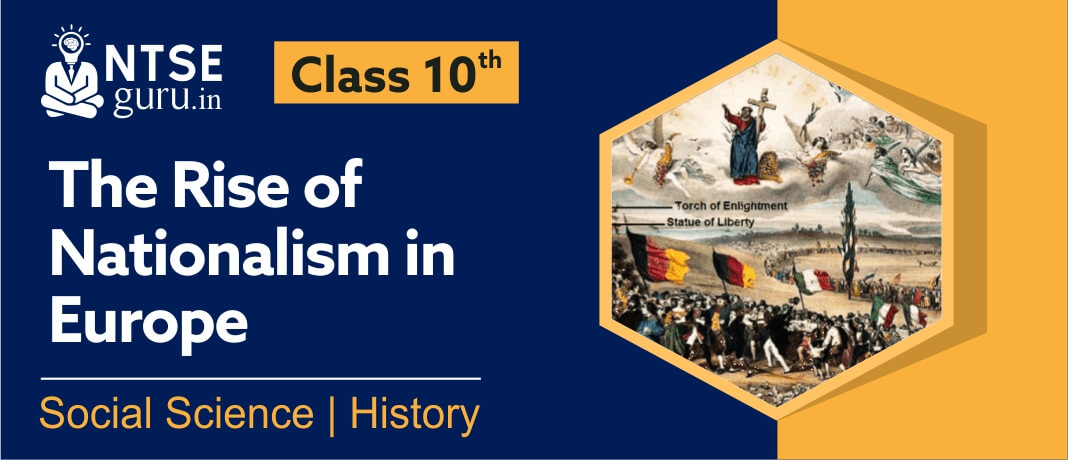Power Sharing Class 10 CBSE Civics Chapter 1
Power Sharing class 10 CBSE is Chapter 1 is of your Civics book Democratic Politics II. Vipin Sir has explained the c...


The class 10 history chapter 1, The Rise of Nationalism in Europe begins with the idea of nationalism and goes on to the French Revolution. After explaining the idea of liberalism, we move on to The Age of Revolutions in which we study about the Unification of Germany and Unification of Italy. Then we take the Visualizing Nation and also cover Nationalism and Imperialism. We have covered the entire chapter so that you know it inside out.
1. According to Ernst Renan, ‘What is a Nation?’
Ans. In a lecture delivered at the University of Sorbonne in 1882, the French philosopher Ernst Renan outlined his understanding of what makes a nation. The lecture was subsequently published as a famous essay entitled ‘Qu’est-ce qu’une nation?’meaning ‘What is a Nation?’
‘A nation is the culmination of a long past of endeavors, sacrifice and devotion. A heroic past, great men, glory that is the social capital upon which one bases a national idea. To have common glories in the past, to have a common will in the present, to have performed great deeds together, to wish to perform still more, these are the essential conditions of being a people. A nation is therefore a large-scale solidarity … Its existence is a daily plebiscite … A province is its inhabitants; if anyone has the right to be consulted, it is the inhabitant. A nation never has any real interest in annexing or holding on to a country against its will.
2. The spirit of nationalism played important role in French Revolution. Explain.
Ans. The first clear expression of nationalism came with the French Revolution in 1789. France was a full-fledged territorial state in 1789 under the rule of an absolute monarch. The political and constitutional changes that came in the wake of the French Revolution led to the transfer of sovereignty from the monarchy to a body of French citizens. The revolution proclaimed that it was the people who would henceforth constitute the nation and shape its destiny.
3. What measures were introduced by French revolutionaries to create a sense of collective identity among French people?
Ans. From the very beginning, the French revolutionaries introduced various measures and practices that could create a sense of collective identity amongst the French people. The ideas of la patrie in the fatherland and le citoyen in the citizen emphasized the notion of a united community enjoying equal rights under a constitution. A new French flag, the tricolor, was chosen to replace the former royal standard. The Estates General was elected by the body of active citizens and renamed the National Assembly. New hymns were composed, oaths taken and martyrs commemorated, all in the name of the nation. A centralized administrative system was put in place and it formulated uniform laws for all citizens within its territory. Internal customs duties and dues were abolished and a uniform system of weights and measures was adopted. Regional dialects were discouraged and French, as it was spoken and written in Paris, became the common language of the nation.
4. What was the reaction of local people to the reforms introduced by French?
Ans. The reactions of the local populations to French rule were mixed. Initially, in many places such as Holland and Switzerland, as well as in certain cities like Brussels, Mainz, Milan and Warsaw, the French armies were welcomed as harbingers of liberty. But the initial enthusiasm soon turned to hostility, as it became clear that the new administrative arrangements did not go hand in hand with political freedom. Increased taxation, censorship, forced conscription into the French armies required to conquer the rest of Europe.
5. Aristocrats enjoyed economic and political privileges. Explain.
Ans:
To get more important questions of class 10 history chapter 1, The Rise of Nationalism in Europe, Login at NTSE Guru or download NTSE Guru App.
Power Sharing Class 10 CBSE Civics Chapter 1
Power Sharing class 10 CBSE is Chapter 1 is of your Civics book Democratic Politics II. Vipin Sir has explained the c...
The Making Of The Global World Class 10
The Making of a Global World is Chapter 4 of Class 10 History book – India and the Contemporary World II. Our video ...
The Age Of Industrialization Class 10
The Age of Industrialization Is Chapter 4 of Class 10 History Book – India and the Contemporary World II. Our v...